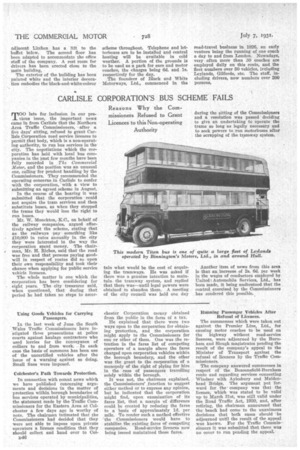Using Goods Vehicles for Carrying Passengers.
Page 100

If you've noticed an error in this article please click here to report it so we can fix it.
In the last week of June the South Wales Traffic Commissioners have instigated three prosecutions at police courts against haulage contractors who used lorries for the conveyance of colliers to and from work. In each case the basis of summons has been use of the uncertified vehicles after the issue of a warning against so doing. Small fines were imposed.
Colchester's Path Towards Protection.
In connection with recent news which we have published concerning arguments and decisions in the matter of protection within borough boundaries of bus services operated by municipalities, the statement made by the Traffic Commissioners for the Eastern Area at Colchester a few days ago is worthy of note. The chairman intimated that the Commissioners had decided that they were not able to impose upon private operators a licence condition that they should collect and hand over to Col D443 chaster Corporation money obtained from the public in the form of a tax.
He explained that there were two ways open to the corporation for obtaining protection, and the corporation might apply to the Commissioners for one or other of them. One was the retention in the fares list of competing operators of a margin above the fares charged upon corporation vehicles within the borough boundary, and the other was the grant to the corporation of a monopoly of the right of plying for hire in the case of passengers travelling solely within the borough.
It was not, the chairman explained, the Commissioners' function to suggest either method or to express any opinion, but he indicated that the corporation might find, upon examination of its fares list, that a margin of difference could be created by reducing the fares to a basis of approximately 1d. per mile. To render such a method effective 'the Commissioners would have to stabilize the existing fares of competing companies. Road-service licenees now being issued maintained those fares. Running Passenger Vehicles After Refusal of Licences.
The summonses which were taken out against the Premier Line, Ltd., for causing motor coaches to be used on the highway without road-service licences, were adjourned by the Burnham and Slough magistrates pending the result of the company's appeal to the Minister of Transport against the refusal of licences by the Traffie Commissioners.
The company answered summonses in respect of the Beaeonsfield-Burnham route and regarding services connecting Windsor with Aylesbury and Maidenhead Bridge. The argument put forward for the company was that the licence, which was stated to be valid up to March 31st, was still valid under the Road Traffic Act, 1930, and, after retiring, the chairman announced that the bench had come to the unanimous decisions that both cases should be adjourned until the result of the appeal was known. For the Traffic Commissioners it was submitted that there was no cover to run pending the appeal.




























































































































































